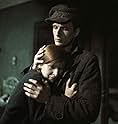Ajouter une intrigue dans votre langueAfter the death of his father, young Karl Siebrecht goes to Berlin to make a fortune.After the death of his father, young Karl Siebrecht goes to Berlin to make a fortune.After the death of his father, young Karl Siebrecht goes to Berlin to make a fortune.
- Prix
- 2 victoires au total
Parcourir les épisodes
Photos
Histoire
Le saviez-vous
- AnecdotesAfter the death of his father young Karl Siebrecht goes to Berlin to make a fortune.
- ConnexionsReferenced in Disco: Episode #1.97 (1979)
Commentaire en vedette
In pre-WWI Germany life of the common people was a seemingly endless struggle for mere survival. Even the most basic human needs like food and shelter frequently seemed out of reach for some. The talents of able bodied men were exploited and miserably compensated to assure highest profits for the "bosses". Is it any wonder that the time was ripe for a revolt by the struggling masses? Who was going to finally give them their fair deal in an industrial revolution?
Our hero Karl Siebrecht comes of age during this time. He is a well educated newly orphaned 16 year old who decides to leave his provincial home with no more than a suitcase and 10 Goldtaler selflessly given to him by an elderly family friend. He was off to find his way to success in Berlin, the city where hard work and good ideas would always be rewarded. - Enthusiasts of regional German dialects will enjoy the rich flavor of Berliner Schnauze, which had it's Golden Age during the early 1900s!
From the beginning, Siebrecht is supported by loyal friends, and also surrounded by those who want to turn Siebrecht's genius to their own financial advantage, even trick the man out of his fortune. From ca. 1910 right up to and beyond the Great Inflation of 1923, many brutal failures always turned back around to new fortunes. Although rightfully viewed as arrogant, even tyrannical, Karl Siebrecht never totally loses his moral compass, his sense of right and wrong. He would never be the kind of "rich man" who would walk all over "little people". In his utopia, the tide lifts all boats, not just a few big ones.
This 13 part series nicely combines personal i.e. family drama of the principles with the turbulent social and political changes during a particularly eventful period in German (and World) History. With an undying human spirit to face any and all troubles life can throw at you, people forged on. A small scene toward the end of the story shows the long suffering and tirelessly working Rieke busy handling the many orders for special sewing. She can't believe people would sacrifice valuable cloth just to hang flags out of their windows. Without any commentary, we see large piles of flags: One with the dominant Nazi symbol, the other Communist. A quiet way of saying: We don't care who hires us to do work, we need the money to survive.
This gem of a TV series is historical fiction at its best. I give it my highest recommendation.
Our hero Karl Siebrecht comes of age during this time. He is a well educated newly orphaned 16 year old who decides to leave his provincial home with no more than a suitcase and 10 Goldtaler selflessly given to him by an elderly family friend. He was off to find his way to success in Berlin, the city where hard work and good ideas would always be rewarded. - Enthusiasts of regional German dialects will enjoy the rich flavor of Berliner Schnauze, which had it's Golden Age during the early 1900s!
From the beginning, Siebrecht is supported by loyal friends, and also surrounded by those who want to turn Siebrecht's genius to their own financial advantage, even trick the man out of his fortune. From ca. 1910 right up to and beyond the Great Inflation of 1923, many brutal failures always turned back around to new fortunes. Although rightfully viewed as arrogant, even tyrannical, Karl Siebrecht never totally loses his moral compass, his sense of right and wrong. He would never be the kind of "rich man" who would walk all over "little people". In his utopia, the tide lifts all boats, not just a few big ones.
This 13 part series nicely combines personal i.e. family drama of the principles with the turbulent social and political changes during a particularly eventful period in German (and World) History. With an undying human spirit to face any and all troubles life can throw at you, people forged on. A small scene toward the end of the story shows the long suffering and tirelessly working Rieke busy handling the many orders for special sewing. She can't believe people would sacrifice valuable cloth just to hang flags out of their windows. Without any commentary, we see large piles of flags: One with the dominant Nazi symbol, the other Communist. A quiet way of saying: We don't care who hires us to do work, we need the money to survive.
This gem of a TV series is historical fiction at its best. I give it my highest recommendation.
- thursdaysrecords
- 29 sept. 2018
- Lien permanent
Meilleurs choix
Connectez-vous pour évaluer et surveiller les recommandations personnalisées
Détails
- Date de sortie
- Pays d’origine
- Langue
- Aussi connu sous le nom de
- Sin egen lyckas smed
- Lieux de tournage
- sociétés de production
- Consultez plus de crédits d'entreprise sur IMDbPro
Contribuer à cette page
Suggérer une modification ou ajouter du contenu manquant

Lacune principale
By what name was Ein Mann will nach oben (1978) officially released in Canada in English?
Répondre









